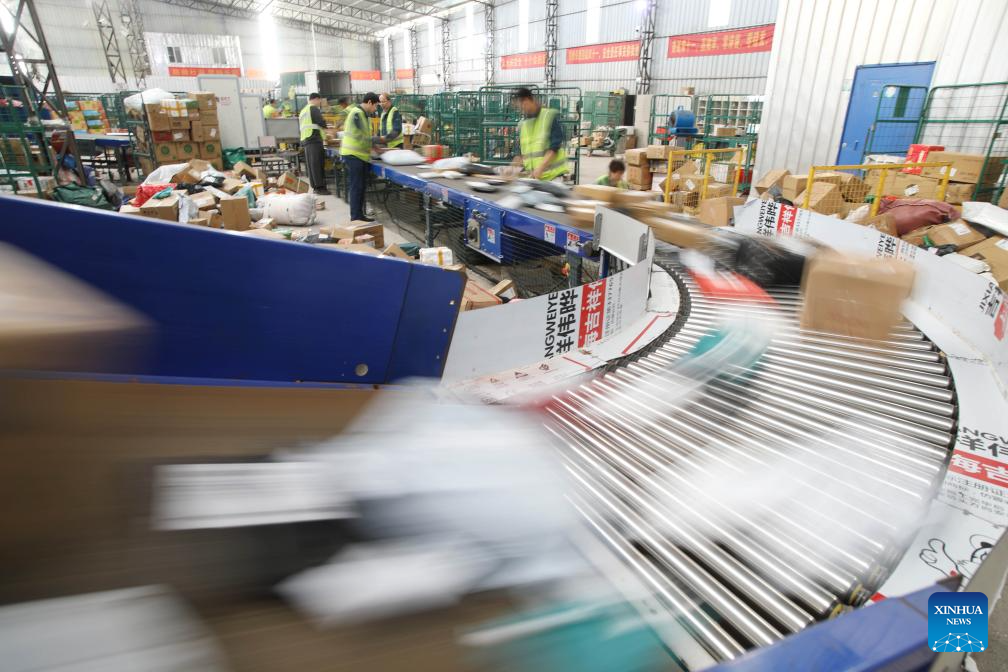
The extended Singles Day shopping festival this year saw robust sales during its grand opening on Monday evening, with major e-commerce platforms ramping up efforts to provide discounts and shopping subsidies, and simplify promotional methods to attract price-conscious consumers.
Experts said that as China's biggest online shopping event, the 11-11 — or Double Eleven promotional campaign — is expected to witness the accelerated application of AI technology in the retail sector to improve merchants' operational efficiency, offer shoppers personalized guidance and bolster sales.
Data from Tmall, Alibaba Group's e-commerce platform, showed that in the first hour after the shopping carnival kicked off at 8 pm on Monday, 80 brands witnessed their sales surpass 100 million yuan ($14 million). The turnover of more than 30,000 brands doubled year-on-year, while sales of over 18,000 brands exceeded that of the entire day last year within the first hour of the gala.
Liu Bo, president of Tmall, said this year's 11-11 promotional shopping extravaganza presents the most significant opportunity for brands throughout the year, and its role in driving brands' business growth is irreplaceable and increasingly vital.
Liu highlighted the importance of the convergence of AI and consumption, saying the company is betting big on AI and aims to help merchants improve product quality and operational efficiency.
It is promoting the large-scale deployment of AI on Taobao and Tmall, and integrating large language models into the platforms' core search and recommendation engines to entice more consumers and boost sales. Tmall will also issue 50 billion yuan worth of shopping coupons and subsidies to shoppers during the buying spree.
According to JD, another major e-commerce player, the turnover of more than 52,000 brands surged more than 300 percent between 8 pm on Oct 9, when its promotional gala opened on 6 pm on Monday. Over 3,300 product categories saw their sales soar over 100 percent from a year earlier.
Consumer electronics maintained rapid growth, with AI-related products experiencing a nearly 200 percent year-on-year increase in sales via JD's online marketplaces, while more than 2,000 home appliance and furniture brands skyrocketed over 100 percent year-on-year.
ALSO READ: Singles Day sales soar on smart deals
Hong Yong, an associate research fellow at the Chinese Academy of International Trade and Economic Cooperation, said major e-commerce platforms have made promotional methods simpler this time, with direct price cuts being a preferred strategy, which is conducive to improving consumers' shopping experience.
"It is noteworthy that AI technology is deeply reshaping the decision-making process and operational efficiency in the retail sector. For instance, consumers can precisely select products by using AI-powered search tools, while AI will help merchants lower operational costs and improve efficiency in terms of product design, marketing and customer services," Hong said.
He said China's consumption market is poised for steady growth this year, with a significant rebound expected in the durable goods, electronic devices and home appliance sectors fueled by the consumer goods trade-in program and discounts provided by e-commerce platforms.
Jason Yu, general manager of CTR Market Research, said this year's promotional gala marks a significant milestone for AI in empowering the e-commerce industry, as online retailers have provided shoppers with personalized recommendations with AI tools, analyzing consumer needs and preferences, and optimizing sales strategies.
Yu said e-commerce platforms have extended the promotional period — as the Singles Day shopping extravaganza has been stretched into a nearly four-week event — emphasizing that the meteoric rise of instant retail, a combination of online shopping and instant delivery, will be a "new battlefield "for major internet and e-commerce companies.
The integration between online and offline shopping will be the future direction for the retail sector, and the key lies in how to make use of online traffic to stimulate consumers' purchasing appetites away from offline shopping scenarios, he added.
As Alibaba has significant investment in instant retail, Taobao Instant Commerce is participating in the promotional event for the first time. At present, a total of 37,000 brands and 400,000 offline stores have been connected to the company's instant retail business.
READ MORE: Quality focus rules Singles Day shopping gala
Mo Daiqing, a senior analyst at the Internet Economy Institute, a domestic consultancy, said Chinese consumers have become more value-conscious and are paying more attention to the quality and cost-effectiveness of goods, adding that online retailers should launch new products and upgrade supply chains to attract a new breed of young shoppers.


